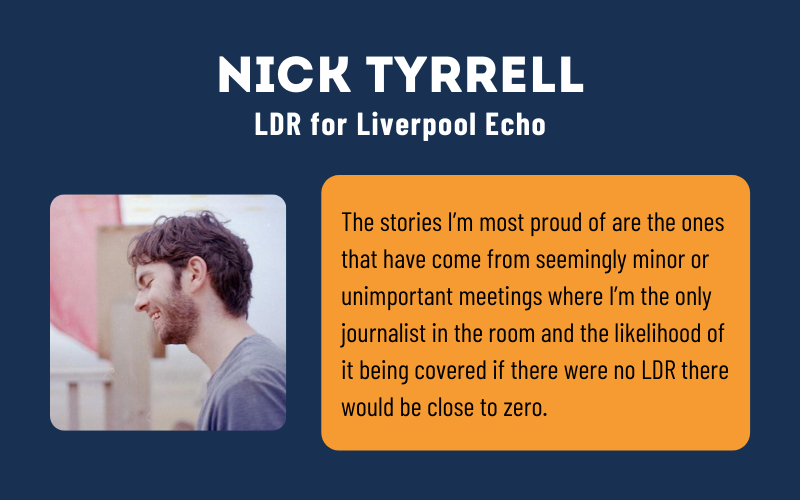Everything you need to know about local democracy reporters
You might have come across journalists who describe themselves as ‘local democracy reporters’ – but who are they and what do they do? Here is everything you need to know!
We spoke to News Associates alumni who now work as local democracy reporters (LDRs) about their roles and what makes them different from other news reporters.
What is a local democracy reporter?
In 2017, the BBC struck up a deal with regional press to create the LDR roles, with the aim of strengthening local news coverage in the UK.
There are now at least 165 LDRs covering regional news across the country.
We asked our alumni to describe what they think an LDR is…

What does a typical day look like?
Joseph Timan, LDR for Manchester Evening News (MEN), said: “Each day’s activities depend on which local government meetings are held in public on that day and what’s on the agenda.
“Like any reporter role, having good contacts is crucial to keep on top of what is happening outside of meetings held in public where many important decisions are formally made.”

Alice Richardson, also an LDR for MEN, added: “We have to produce between 8-10 stories a week (around 40 per month) which can sometimes be tough but keeps you on your toes.”
Ed Sheridan, LDR for Hackney, Islington and Camden Citizen, said: “My typical day is split between covering decisions made or debates held at council meetings on my patch and interviewing residents on issues relating to the local authority.”
What is the best thing about being a local democracy reporter?
Nick Tyrrell, LDR for Liverpool Echo, said: “The variety of the work and the autonomy you get in reporting on stories. The phrase about every day not being the same is a cliché but really is true for my job.”
Alice loves the chance to make a real impact on local communities. She said: “The stories I get to cover are a lot more in-depth than some of the regular reporters get to do and sometimes I can directly see the ways in which my work has brought about change for the people I’ve spoken to and written about, which is really rewarding.”
Ed said: “The best thing about being an LDR is the opportunity to give a platform to voices within the community and take issues forward on local democratic issues which otherwise have the potential to go unheard in the day to day business of a Town Hall.”

How did your NCTJ training prepare you for the job?
Joseph found his first journalism role directly as a result of his time at News Associates. He said: “News Associates helped me contact the right people to find a weekly work placement which ultimately led me to being offered my first job as an LDR.
“Public affairs also gave me a good understanding of how local government works, especially as my tutor was able to offer many practical examples from his own experience as a politics reporter at a local newspaper for many years.”
Alice said: “The media law training, ethics, shorthand, public affairs knowledge and reporting practice I got at NA gave me the leg up into the industry I needed.
“It meant I was trusted to go straight into a senior role covering complex political issues in a busy newsroom and hit the ground running, knowing the basics were already under my belt.”

Ed uses shorthand every day in his LDR role, a skill which he would have never acquired without NCTJ training. He said: “Shorthand! Shorthand, shorthand, shorthand. Without News Associates’ invaluable training in this area, I wouldn’t have been able to do the job, period.
“Get that 100wpm if you can, and keep it going once you’ve got it; easy to get rusty if you stop using it.”
Nick said: “Aside from the core skills on the NCTJ curriculum, which tutors always taught brilliantly, I think NA is just really good at making you better at finding original stories and telling them in an interesting way.”

What advice do you have for anyone wanting to become an LDR?
Alice suggests paying attention in public affairs classes. She said: “Take time to get to know your political structures so you know who to go to for comment on which story – this also saves the embarrassment of approaching the wrong body for comment and looking a bit foolish.”
Ed said you must first and foremost become a good journalist. He said: “The only real thing that I think really qualifies you to do this job is to really care about the community you cover.
“As far as I can tell, the skills you need to be a good LDR are simply those you need to be a good reporter.”
Nick said: “Read the work of current LDRs. Reading their stories and tracing them back to the meeting or document they got them from can give you a better sense of how local democracy reporters find stories.”
From local news to showbiz and entertainment, our alumni end up in a wide variety of journalism jobs! Check out our interview with Beth Kirkbride on how she got into entertainment journalism.


